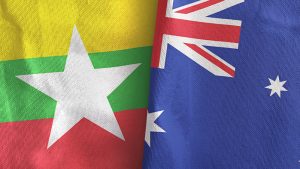Australian lawmakers have pressed their government to step up its pressure against Myanmar’s military government, by considering the imposition of fresh sanctions on leading commanders and military enterprises.
The report by the Joint Standing Committee on Foreign Affairs, Defense, and Trade, which includes members of Australia’s two major parties, also called on the government to explore how it could offer permanent residency to Myanmar citizens living in Australia who fear returning home.
The committee’s report assesses Australia’s response to the military’s seizure of power in Myanmar in early February, which has tipped the nation into a crisis with no apparent end. Since the coup, at least 800 people have been killed by the security forces, while thousands have been arrested, prompting Western nations to impose a range of sanctions against Sen. Gen. Min Aung Hlaing’s junta.
So far, Australia has suspended military cooperation with Myanmar and redirected foreign aid away from the junta, while endorsing the currently stalled efforts by the Association of Southeast Asian Nations (ASEAN) to resolve the crisis. But it has so far held off from imposing significant sanctions on senior junta leaders, with one Department of Defense official stating recently that sanctions were “not a silver bullet.”
In early June, Foreign Minister Marise Payne defended Australia’s decision to hold off on imposing harsh sanctions on the junta. “It is not our view that they would advance our interests and our interests in supporting the ASEAN-led solution and the ASEAN efforts that are being made,” she said.
The dilatory response has attracted criticism from Australia’s Myanmar community and human rights advocates, with the Australian Council for International Development recently urging the government to “join with like-minded democracies and hit the Myanmar military where it hurts.” It added: “The Australian Government should take immediate steps to sanction the Myanmar military leadership and the entities financing their operations.”
The committee’s report largely endorsed the government’s actions thus far, but said that there was more that it could do “to pursue the restoration of civilian rule in Myanmar as a foreign policy objective.”
While acknowledging that there were “different views on the issue of the effectiveness of sanctions amongst Committee members, as there are amongst the international community,” the report stated that the government should consider imposing “targeted sanctions upon additional senior figures in the Tatmadaw.” It added that government could also target military-linked conglomerates like the Myanmar Economic Corporation and the Myanmar Economic Holdings Limited, both of which have already been sanctioned by the United States and other Western powers.
The committee recommended that the Australian government “formally engage with groups and individuals representing the legitimately-elected representatives of Myanmar,” including the National Unity Government formed in April. It also said that any dealings between Canberra and Naypyidaw should “be highly selective, and that care be taken to avoid conveying any sense of legitimacy to military rule in Myanmar.”
Another of its key recommendations was that the Department of Home Affairs explore “pathways to permanent residency for Myanmar nationals in Australia given the uncertain situation they face in Myanmar.” The government has already promised Myanmar students and citizens living in Australia they will not be forced to return home, according to the ABC, but the committee report noted there was still “substantial anxiety within the Myanmar diaspora in Australia about the lack of clarity around visa conditions.”
It is unclear whether the Australian government will adopt the committee’s recommendation of considering harsher sanctions, and whether it would make much difference if it did. In this way, the report highlights the dilemma facing Western democracies opposed to the sorry turn of events in Myanmar: that without the support of Myanmar’s Asian neighbors – including China, Japan, India, and the nations of ASEAN – there is little chance of truly isolating the country’s military government.
































